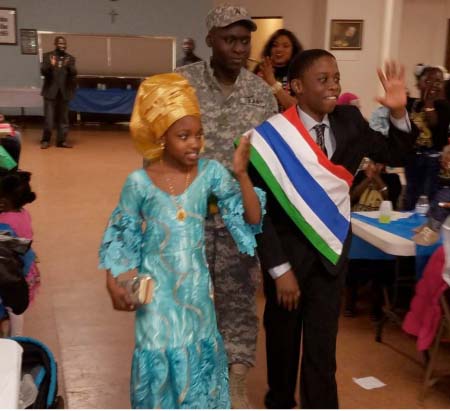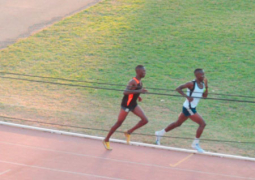
Gambians
in Minnesota turned out in their large numbers last Saturday March 4th to mark
the country’s 52NDIndependenceAnniversarycelebrations.
Organized
by the Leadership of the Gambian Association in Minnesota, the event was also
attended by presidents and executive members of sister West African
organizations in Minnesota, and among them were the presidents of Ghana
Association, Edmund Ocansey, Nigerian
Association, Grace Mobosi, Mali Association, Musa Diawarra, Senegalese
Association, Haddy Haidara accompanied by their executive members and families,
and representatives of the Minnesota Mandigo Liberian Association and friends
of The Gambia.
Also
in attendance were members and the president of West African Collaborative in
Minnesota- WAC- Lawyer Kwao Amegashie, which is made up of the leadership of
West African national organizations in Minnesota.
Its
mission is to bring West African communities and organizations in Minnesota
together to collaborate, build capacity, and address shared needs and visions.
The
colourful and fun-packed event presented selected children from the community
who posed as president, vice president, cabinet ministers and security services
to exactly mimic how official independence anniversaries are celebrated in The
Gambia.
In
welcoming the guests, Master of Ceremony
Lamin Gibba, who is also the Secretary General of the Gambia Association in
Minnesota, encouraged all Gambians to be fully engaged in the political
discussions of The Gambia and be prepared to put our leaders to account at all
times. New Gambia cannot afford another type of dictatorship, he emphasized,
and called for participatory democracy in the new political dispensation.
Speaking
to the jubilating crowd immediately after inspecting the guard of honour
mounted by children soldiers, Muhammed Fatty who posed as junior president of
the Gambia re-echoed President Adama Barrow’s independence message, that his
government will embark on programmes that will lead to sustainable development,
good governance and fix the issue of youth unemployment.
He
said crimes against Gambians committed in the last twenty-two years will be
investigated, and people found guilty of crimes will be dealt with according to
the law. The Gambia has changed for good, he said.
Junior
president Fatty noted that the people are fully conscious that they can put a
government in office as well as remove it. No government will ever be able to
entrench itself against the will of the Gambian people. This is the lesson we
must draw from the change that has been brought by the people.
Lamin
Sabally, the president of the GambianAssociation in Minnesota, called for unity
among all Gambians irrespective of their political affiliations, and urged the
community to continue to support the association in order for it to
fullyrealize its goals of promoting unity and cohesion.
Sabally
acknowledged the high-level presence of the presidents of the sister West
African organizations in Minnesota, and described this as show of their
solidarity with The Gambia, as demonstrated by the AU &ECOWAS leaders
through their direct effective involvement in the peaceful resolution of the
political impasse.
The
guest speaker at the event, Papa Faal, an author and renowned civil rights
activist, influentially appealed to Gambians to make their political leaders
accountable at all times, to prevent them from possessing absolute political powers which, he said, is
a recipe for corruption and dictatorship. Faal, who was part of the botched
December 30 attack on State House in an attempt to forcibly dislodge former
President Yahya Jammeh, implored the Gambian electorate to elect leaders with
three fundamental leadership core values in mind: Integrity, Service before
self and Accountability.
In
a moving speech characterized by intermittent rapturous applause from his
attentive audience, Faal, who is a US Navy veteran, said The Gambia’s peaceful
political resolution, which included regional bodies like AU and ECOWAS at the
forefront of negotiations, with support from the UN and powerful western
democracies, is an indication that Africans are capable of solving their own
problems without having to rely exclusively on Western intervention.
He
suggested that The Gambia model should be replicated in all parts of Africa, as
an exemplary model to solve any political problem on the continent.
An
assortment of Senegambian musical entertainment was supplied by Minnesota top
DJ Bless Jagne.


